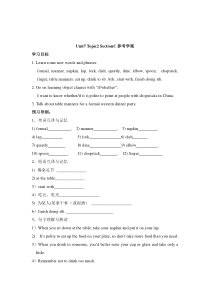 DOC
DOC
【文档说明】Unit 7 Topic 2《I’m not sure whether I can cook it well》(SectionC》word学案-八年级下册英语【仁爱版】.doc,共(4)页,56.500 KB,由小喜鸽上传
转载请保留链接:https://www.ichengzhen.cn/view-104428.html
以下为本文档部分文字说明:
Unit7Topic2SectionC参考学案学习目标1.Learnsomenewwordsandphrases:formal,manner,napkin,lap,fork,dish,quietly,dine,elbow,spoon,chopstick,finger,tablem
anners,eatup,drinktosb./sth.,startwith,finishdoingsth.2.Goonlearningobjectclauseswith“if/whether”:Iwanttoknowwhether/ifitispolitetopointatp
eoplewithchopsticksinChina.3.Talkabouttablemannersforaformalwesterndinnerparty.预习导纲:1、单词互译与记忆1)formal,2)manne
r,3)napkin,4)lap5)fork6)dish7)quietly8)dine9)elbow,10)spoon,11)chopstick,12)finger2、短语互译与记忆1)餐桌礼节______________
2)atthetable______________3)startwith______________4)吃完,吃光___________________5)为某人/某事干杯(或祝酒)___________________6)finishdoingsth.______________
________3、句子理解与熟读1)Whenyousitdownatthetable,takeyournapkinandputitonyourlap.2)It’spolitetoeatupthefoodony
ourplate,sodon’ttakemorefoodthanyouneed.3)Whenyoudrinktosomeone,you’dbetterraiseyourcuporglassandtakeonlyalittle.4)Remembern
ottodrinktoomuch.5)Willpeopleleaveassoonastheyfinisheatinginwesterncountries?课堂导练:1、选词填空whether,drinkto,tablemanner,eatup,
somebody1)It’snecessarytoknowaboutAmericanwhenyouvisitAmerica.2)Themanwasveryhungry.Heallthefoodonthetablesoon.3)Let’sraiseourgla
ssesandthewinners.4)Iheard___________singinthenextroomjustnow..5)Shedoesn’tknow___________it’spoliteornottospeakloudlyatthetable.2.单项选择。()1.—Canyoute
llme______politetoeatsonoisilyinJapan?—Sure.It’spolitetodothatinJapan..A.thatitisB.ifisitC.whetherisi
tD.ifitis()2.It’spoliteto______allthefoodonyourplatewhenyougotoaformalwesterndinnerparty.A.eatupB.giveupC.keepupD.eatout()3.—Doyouknow_____itispolit
etoeatnoisilyinChina?—Yes,Ido.It’snotpolite.A.thatB.ifC.whenD.as()4.Nobodyknows______Mr.Brownwillcomebackinaweekornot.A.ifB.
thatC.whenD.whether()5.—Kate,_____iswaitingforyououtsidetheoffice.—Oh,Isee.It’smyelderbrother,Jack.A.everybodyB
.anybodyC.somebodyD.nobody复习自测:看图短文填词。Peopleindifferentcountrieshavedifferenttablemanners.Somethingthatispoliteinonecountrymaybequite__1______
_inanother.InBritain,youmustn’tliftyourbowltoyourmouthwhenyouare__2__________somesoup.Butit’s__3___________inChina.AndinJapanyouevenneed
n’tworryabout___4__________noisewhileyouarehavingit.Itshowsthatyou___5_______thefood.ButpeopleinBritainthinkitis___6________manners.Ifyo
uareavisitorinMongolia(蒙古)theywishyoucangivealoud“burp(打嗝)”afteryoufinish___7________.Burpingshowsthatyou___8________thefood.So___9________youarein
othercountries,watchcarefullyand___10_________theirtablemanners.课文解读:1.It’spolitetoeatupthefoodonyourplate,so….把盘子里的食物吃
光是礼貌的,所以…..eatup/eat…up意为“吃完,吃光”,类似的短语还有eatup,意为“用完,用光”,2.Whenyoudrinktosomeone,you’dbetterraiseyourcuporglassandtak
eonlyalittle.当你和某人干杯时,你最好举起酒杯只喝一小口。drinktosb/sth意为“为某人/某事干杯(或祝酒)”。如:Let’sdrinktotheGreens.让我们为格林夫妇干杯。3.Iwan
ttoknowwhether/ifitispolitetopointatpeoplewithchopsticksinChina.我想知道在中国用筷子指向别人是否礼貌。一般疑问句作宾语从句时用whether或if引导,意为“是否”。这时一般疑问句要用陈
述句语序,且句末标点为句号。如:IsJaneathomenow?Iwanttoknow.(合并为一句)——Iwanttoknowif/whetherJaneisathomenow.我想知道Jane现在是否在家。4.Idon’tthinkthatitispolitetopo
intatpeoplewithchopsticksinChina.我认为在中国用筷子指向别人是不礼貌的。“Idon’tthink/believethat+从句”这种句型意为“我认为/相信......不……”,在英语
中否定的是宾语从句的内容,习惯上常把否定转移到主句上。如:Idon’tthinkit’sgoingtorainthisafternoon.我认为今天下午不会下雨。5.Willpeopleleaveassoonastheyfinisheatinginwesterncount
ries?在西方国家,人们用完餐就离开吗?finishdoingsth.“完成做某事”。动词finish后可跟名词、代词或动词ing形式。如:Afteryoufinishdoingyourhomework,youcanwatchTV.当你做完作业后,你就可以看电视。评价内容等级自评小组长评价预
习情况ABCD课堂表现ABCD小组合作ABCD
 辽公网安备 21102102000191号
辽公网安备 21102102000191号
 营业执照
营业执照